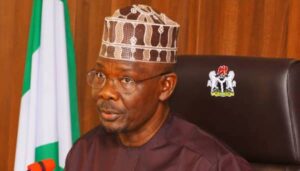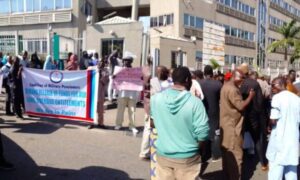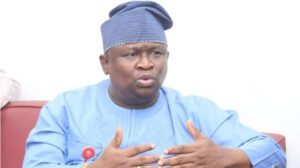10th NASS: Who leads the Senate?
The nineth National Assembly (NASS) will, in few weeks, wind down its parliamentary duties. It was inaugurated on June 11, 2019.
It is expected that that the 10th NASS will be inaugurated in the second week of June.
Ahead of the inauguration, the 109 elected senators and their 360 counterparts in the House of Representatives have begun some pre-induction exercises targeted at taking them through what the nation shall be expecting from them being an important pillar of democratic governance.
According to the Clerk to the National Assembly, Alhaji Sani Tambuwal, the objective of the induction is to expose members-elect to the functions of the NASS, its practices and procedures as well as the services available to them.
Expectedly, the race for who succeeds the outgoing President of the Senate, Ahmad Lawan, has begun with members already forming caucuses to intensify the lobbies for the top job.
The All Progressives Congress (APC), with 59 elected members, has continued to examine factors that would determine who would succeed Lawan with its leaders focusing on a zoning formula that will ensure fairness to all parts of the country.
Unconfirmed reports indicate that President-elect, Sen. Bola Tinubu, is rooting for the zoning of the seat as part of efforts to ensure an all-inclusive government.
Other factors that will determine who leads the upper chamber of the legislature include experience, usually referred to as ranking.
While zoning is an internal arrangement by the ruling APC, ranking is a prerequisite as set up in the Senate Rules.
The APC, with 59 elected members, has the majority of senators and is, thus, poised to produce the next senate president and other principal officers.
The strongest opposition political party, the Peoples Democratic Party (PDP), has 36 senators-elect, the Labour Party (LP), has eight members, while the New Nigeria Peoples Party (NNPP) and the Social Democratic Party (SDP) have two members each.
The All Progressives Grand Alliance (APGA) and Young Peoples Progressive Party (YPP) also have one member each.
Analysts opine that the gender factor may not count much in the Senate leadership race as there are only three females – Idiat Adebule (APC-Lagos), Ipalibo Banigo (PDP-Rivers) and Ireti Kingibe (LP- FCT).
None of the seven female senators of the exiting senate is returning to the house.
A key bloc likely to determine where the pendulum swings is the APC governors’ bloc.
At a recent meeting with Tinubu and the leadership of the APC, it was resolved that the senate presidency be zoned to the South, but not to any particular zone of that bloc.
Tinubu had argued that since APC members stood for the zoning of the presidency to the South and not to any of the three zones in the area, it would be wrong to propose zoning the senate presidency to any area specifically.
He was quoted as saying that zoning the post to the south would give aspirants from South-East and South-South equal opportunity to go into a fair contest.
Names connected to the race include Lawan, the incumbent, Sen. Barau Jibrin (APC-Kano), Sen. Sani Musa (APC-Niger), and Sen. Orji Uzor Kalu (APC-Abia).
Also on the list are Sen. Godswill Akpabio (APC-Akwa-Ibom), Abdul’Aziz Yari (APC-Zamfara) and Ali Ndume (APC-Borno).
Barau, currently Chairman, Senate Committee on Appropriation, believes he is the most competent candidate for the top NASS job, citing experience.
“The Senate leadership requires competence. It doesn’t work on sentiments. It is the tradition all over the world. It is there in our rules and this rule is a product of our constitution.
“It is clearly in our Standing Rules too that aspiration or election for the Office of the Senate President shall be in accordance with ranking.
“Among those seeking to occupy that office, I have the highest ranking. I’m the most experienced.
“You need to be grounded in procedure of legislation before you are able to be the President of the Senate.
“Do you now relegate competence for other sentiments?,” he asked, rhetorically.
But a pressure group, Concerned All Progressives Congress Members Forum, is backing Akpabio for the job while Jibrin should come under him as Deputy Senate President.
The group premises its stance on the federal character principle enshrined in the nation’s statutory books.
According to him, the development will go a long way in building the confidence of party members across the country in preparation for the future of the party.
Mr Odogwu Ogenyi, convener of the group, argues that Akpabio’s emergence would ensure fairness to all segments of the nation.
“In the National Assembly, Sen. Akpabio is the most ranking senator from the South-South on the platform of the APC, while Sen. Barau Jibrin is the most ranking senator from the North- West.
“We need a pan-Nigerian who has been tested and trusted, proven worthy of integrity, character and prudent management of resources.
“The President-elect is from the South-West and the Vice President-elect is from the Nort-East; the Senate President should be zoned to the South-South and the Deputy Senate President to the North-West.”
Another support group rooting for the Akpabio/Jibrin ticket is the Conference of All Progressives Congress, who has appealed to Jibrin to work with Akpabio in the contest.
The group’s National Chairman, Alhaji Gambo Jagindi, told newsmen recently that critical stakeholders of the APC should not leave anything to chance in ensuring that those who worked for its success general elections were carried along.
”This is to avoid a reoccurrence of the 2015 scenario where some elected National Assembly members on the platform of the APC formed an ‘unholy alliance’ with opposition parties and rocked the boat of the APC.
“The party must never allow such unpleasant and retrogressive histories to be repeated.
”The seat of the President of the Senate is a top position which wields a lot of influence that can make or mar the executive.
“This position must, therefore, be given only to a party member who will ensure that the APC is seen as the true national party that it is, to ensure the growth and development of Nigeria.
”Akpabio and Jibrin are two legislators that have contributed immensely to the development of democracy in the party and the Senate. It will be a great achievement if they emerged leaders of the Senate.”
Meanwhile, unconfirmed reports indicate that Sen. Sani Musa (APC-Niger), who initially indicated interest in seeking the top job, has backed out of the race.
The reports claimed that he had turned his eyes to the Deputy Senate President’s seat.
The senator-elect from the North-Central is said to have argued that the least position the zone deserved was the office of Deputy President of the Senate.
Former House of Representatives member, Aliyu Wadada, from Nasarawa State in Musa’s zone, agrees with him.
“We are aware that there are agitations from various geo- political zones for the positions of Senate President, Deputy Senate President, Speaker and Deputy Speaker.
“The South-West and North-East have produced the president and vice president. The north-central deserves a respectable position.
“We shall work in harmony with other geo-political zones toward Musa’s emergence as Deputy Senate President of the 10th Senate,” he told newsmen recently.
But for Sen. Opeyemi Bamidele (APC-Ekiti), religious and ethnic sentiments should not be considered as yardsticks for deciding who leads the Senate.
Bamidele, Chairman, Senate Committee on Judiciary, Human Rights and Legal Matters, argues that competence and experience should be the determinants.
“These are the factors that should be in our minds. Tribe and religion should not come in.”
As the day for the inauguration gets closer, analysts say that those to lead the 10th National Assembly should be able to change the narrative of the previous assemblies that were generally seen a mere “rubber stamp” to the executive.
They premise that stance on the belief that only an independent legislature can check the executive and strenghen the nation’s democracy. (NANFeatures)
** If used, please credit the writer and the News Agency of Nigeria




